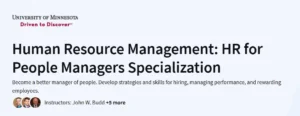What you will learn in Excel Skills for Business Specialization Course
- Gain a comprehensive understanding of Excel functions, formulas, and data analysis techniques.
- Learn data visualization, pivot tables, and advanced Excel tools to interpret and present insights effectively.
- Develop expertise in automation with macros and VBA for efficient workflow management.
- Understand financial modeling, business analytics, and statistical analysis using Excel.
- Work on real-world projects to apply Excel skills in data-driven decision-making.
- Enhance problem-solving and critical thinking abilities with Excel-based case studies.
Program Overview
Excel Fundamentals and Data Entry
⏱️4-6 weeks
- Learn basic functions, formulas, and spreadsheet navigation.
- Understand data formatting, conditional formatting, and data validation.
- Gain proficiency in sorting, filtering, and organizing large datasets.
Data Analysis and Visualization
⏱️ 6-8 weeks
- Create pivot tables and charts to summarize and analyze data.
- Use Excel functions like VLOOKUP, INDEX-MATCH, and IF statements.
- Apply statistical techniques to analyze trends and patterns.
Advanced Excel Tools and Automation
⏱️ 8-12 weeks
- Master Power Query, Power Pivot, and advanced data modeling.
- Automate workflows with Excel Macros and VBA programming.
- Learn scenario analysis and forecasting techniques.
Business Applications and Capstone Project
⏱️ 12-15 weeks
- Work on real-world business cases using Excel analytics.
- Develop financial models and budget forecasting using Excel.
- Complete a final project demonstrating Excel mastery.
Get certificate
Job Outlook
- Excel skills are in high demand across finance, marketing, operations, and data analytics roles.
- Proficiency in Excel can lead to higher-paying jobs in data-driven fields.
- Many employers seek candidates with Excel automation and data analysis expertise.
- Excel is a foundational skill for careers in business intelligence, accounting, and consulting.
Specification: Excel Skills for Business Specialization
|
FAQs
- A beginner-friendly, four-course online specialization by Macquarie University, designed to help learners build solid Excel skills for business applications. It’s accessible through Coursera and carries a strong reputation.
- It walks you through four structured courses—Essentials, Intermediate I, Intermediate II, and Advanced—covering everything from basic navigation to advanced modeling and dashboard creation.
- Popular among learners, it has over 600,000 enrollments and a nearly perfect 4.9-star rating from almost 47,000 reviews.
- Absolutely anyone—no prior experience required, making it ideal for beginners looking to gain Excel fluency in a business context.
Recent learner feedback on Reddit reflects enthusiastic recommendations:
“The way they explain, exercises, practices, scenario… everyone can follow.”
Another user added:
“This specialization is … novice-friendly, and lots of exercises to practice.”
- Essentials course (26 hours, ~3 weeks) teaches navigation, formatting, data entry, formulas, charts, filtering, printing, and layout.
- Intermediate I (~27 hours) covers named ranges, advanced formulas like COUNTIFS, working with tables, pivot tables, charts, slicers, and dashboard basics.
- Intermediate II and Advanced courses delve into macros, data modeling, validation, automation, complex financial functions, array formulas, and building interactive dashboards.
- Total recommended pace is 3 months at 10 hours per week, but many learners finish in 1–2 months at an accelerated pace.
- Fully self-paced, with modules typically structured in 6-week segments—each featuring videos, readings, and quizzes.
- Many highlight how learner-driven scheduling, paired with diligent practice, can significantly speed progress.
- It’s consistently praised in discussions:
“Excel Skills for Business by Macquarie University is amazing.”
“The best bang for the buck … well thought out and challenging with lots of practice.”
LinkedIn users who completed parts or all of the specialization report gains in automation, dashboards, pivot proficiency, and analytical confidence.
However, learners also stress: practice makes permanent—the real value comes from applying the skills to real tasks.





